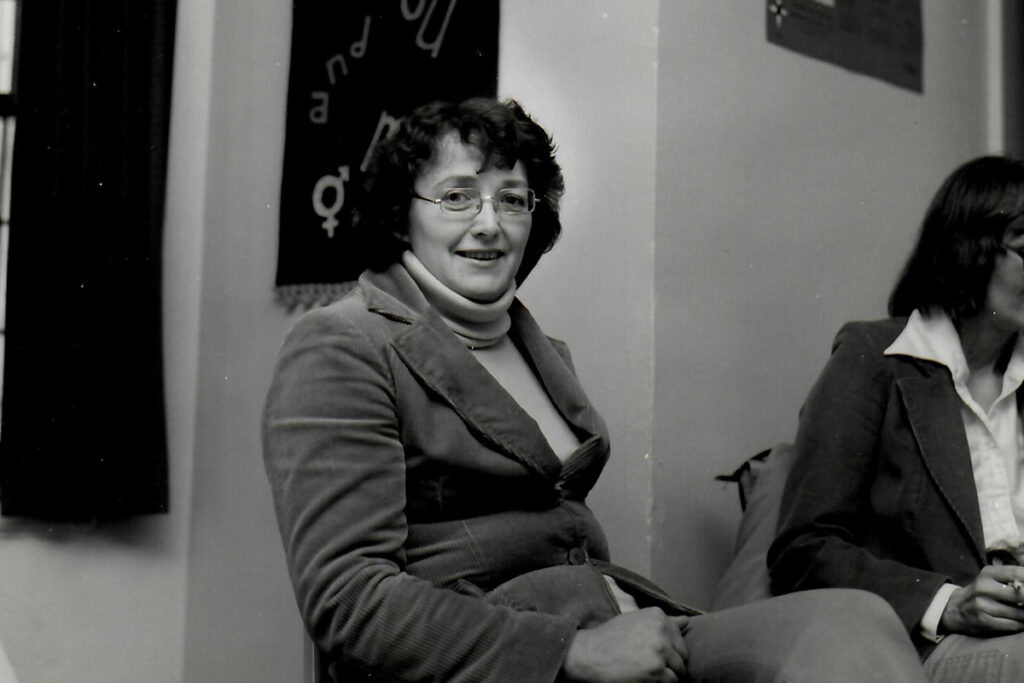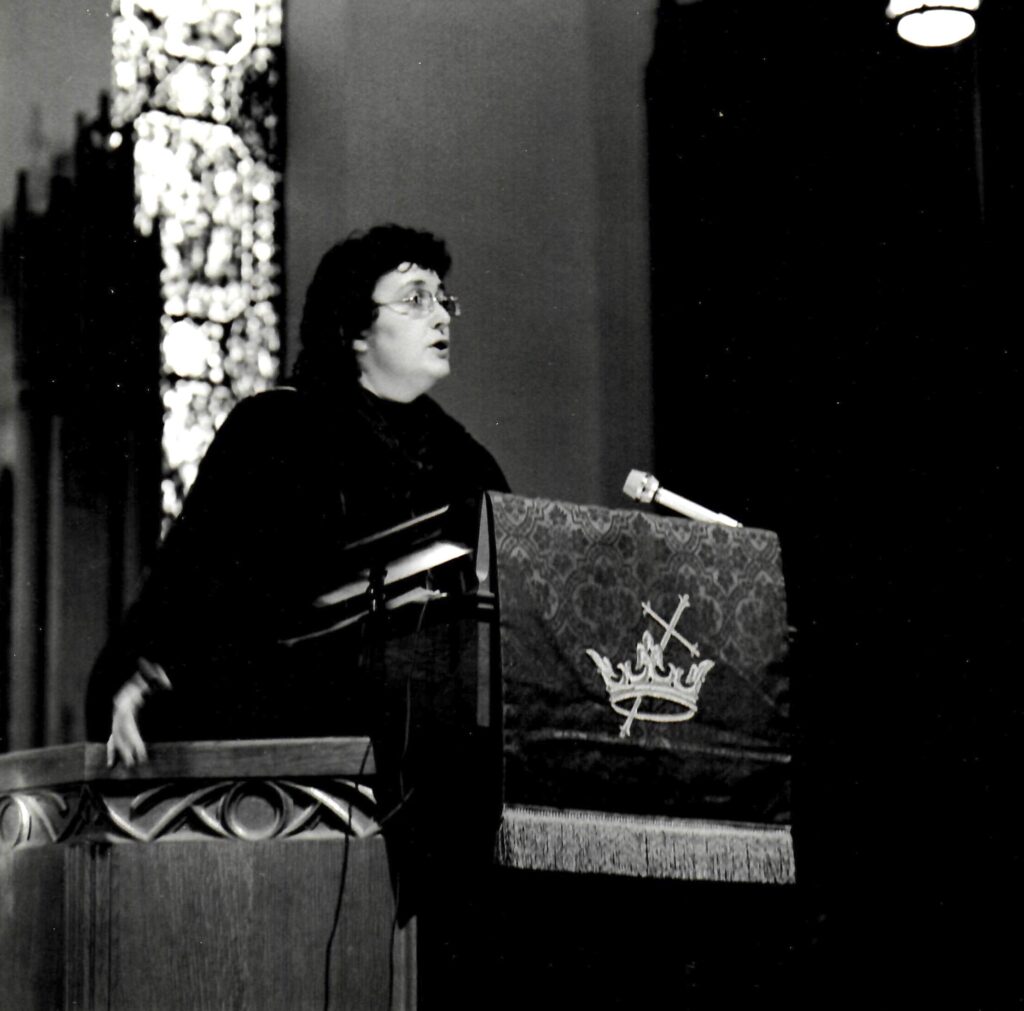Remembering Dr. Rosemary Radford Ruether, Pioneering Feminist Theologian, Emerita Professor, and Tomato Grower
May 24, 2022

Dr. Rosemary Radford Ruether, pioneering feminist theologian, Georgia Harkness professor of applied theology (emerita) at Garrett-Evangelical Theological Seminary, and grower of tomatoes, died on Saturday, May 21, 2022, at the age of 85.
Known as a pioneering feminist, Catholic theologian, Ruether challenged the dominant patriarchal paradigm from the very beginning of her academic career in 1968 when she wrote and gave her first major essay on sexism, titled “Male Chauvinist Theology and the Anger of Women.” She would go on to write 36 books—including the systematic Sexism and God-Talk in 1983 and the ecofeminist primer Gaia and God in 1992—and hundreds of articles and book contributions, enough to fill eight pages, single spaced, on her CV.
“Rosemary Radford Ruether was a brilliant, fierce, and compelling voice for women, the poor, the earth, the so many others that the institutional church and the theological academy intentionally and unintentionally sought to silence or diminish,” said Javier A. Viera, president of Garrett-Evangelical. “I first encountered her work as a seminarian and her critique of the theological systems that had formed my faith and worldview rocked my world, in part because it came from a place of deep faithfulness and genuine hope for renewal. Her presence is still strongly felt at Garrett-Evangelical, and her scholarship will continue to influence who we are. Because of her work and legacy, we will continue to amplify the voices and experiences of those she fought so hard to make sure were heard, seen, and taken seriously.”

Ruether joined the faculty of Garrett-Evangelical in 1976 and was installed as the Georgia Harkness professor of applied theology in 1977. She was the first woman to hold an endowed chair in the seminary’s now 168-year history. She would retain this post until her retirement in 2002.
As a long-standing faculty member, Ruether taught thousands of students both in the classroom and beyond. A scholar activist with expertise in feminist theology and religion, Catholicism, ecofeminist theology, peace studies, human rights, and more, Ruether was well respected and beloved by students, members of the academy, and co-conspirators both in the United States and throughout the world.
In May 2015, Ruether returned to Garrett-Evangelical for the first time upon retirement. Her lecture, held in the seminary’s Chapel of the Unnamed Faithful, focused on ecofeminism and a re-thinking of God, the environment, and our society. It was a full circle moment, as Ruether has long been committed to the work of ecojustice both in theory and in practice. As a faculty member she challenged the seminary’s administration with the simple but impactful act of growing tomatoes in a small plot of land outside of her office window. Amongst an urban and bustling university campus landscape, the tomatoes served as a physical reminder to return to the land and to seek out Christian thought and practice that can help overcome and heal the ecological crisis.
A classicist by training, Ruether studied religion and philosophy at Scripps College, earning her bachelor of arts in 1958. At the Claremont Graduate School, she earned both her master of arts in ancient history in 1960 and her doctor of philosophy in classics and patristics in 1965. She held honorary degrees from numerous universities including Denison University, Ohio (1982); Emmanuel College, Boston (1982); Hamilton College, New York (1983); St. Xavier’s College, Chicago (1983); Wittenburg College, Ohio (1983); St. Olaf’s College, Minnesota (1984); Walsh College, Ohio (1984); DePauw University, Indiana (1986); Merrimack College, Massachusetts (1991); and St. Bernard Seminary, New York (1992).
Born November 2, 1936, in Saint Paul, Minnesota, Ruether was raised in Washington, D.C., and La Jolla, California, as the youngest of three daughters of a Catholic mother and an Episcopalian father. Ruether’s father died when she was 12, leaving her to be raised by her mother and her aunt. In 1957, Ruether married Herman J. Ruether, a professor in political science and Asian studies. Together, they raised three children, Rebecca, David, and Mimi.
We offer our heartfelt condolences to Rosemary’s family, friends, the seminary community, and all who were impacted by her teachings and writings. May her legacy live on forever.
Alumna Heidi Schlumpf (G-ETS 2000), who serves as the executive director of the National Catholic Reporter (NCR), has written a memorial piece for Ruether, dated May 21, 2022. Ruether served as a long-standing columnist for the NCR.
To read this article, go to: https://www.ncronline.org/news/people/pioneering-feminist-theologian-rosemary-radford-ruether-dies-85
Additional Articles:
-
“Rosemary Radford Ruether, Feminist Theologian, Dies at 85” (New York Times, May 27, 2022)
-
“A life lived for justice: Rosemary Radford Ruether” (Religion News Service, May 27, 2022)
- “Feminism and Peace” by Rosemard Radford Ruether” (The Christian Century, January 1, 1983)
 An Appreciative Tribute for Dr. Rosemary Radford Ruether
An Appreciative Tribute for Dr. Rosemary Radford Ruether
Dr. Neal F. Fisher, President Emeritus (President 1980-2001)
The world will rightly remember and applaud the immense contribution of Professor Rosemary Radford Ruether to our understanding of Christian faith through her extensive list of pioneering books, articles, and lectures. For twenty-six years she served at Garrett-Evangelical as Georgia Harkness Professor of Applied Theology. Those of us who served with her and the students who studied with her recall with gratitude her indefatigable scholarship and her effort to present Christian faith shorn of patriarchy and racism. Along with our respect for her prophetic statement of the faith, we also remember Rosemary as a sturdy friend who once evidenced care of the earth by planting and tending a small garden on the campus and who never failed in conversations to disarm the incongruities and hypocrisies of society with her understated sense of humor. Together with all who profit from her uncompromising commitment to faith and justice we give thanks for a pioneering prophet and friend.
 Reflection on Rosemary Radford Ruether
Reflection on Rosemary Radford Ruether
Dr. Lallene J. Rector, President Emerita (2014-2020) and Faculty Member (1986-Present)
Rosemary was one of 5 female faculty members when I joined in 1986, then constituting approximately 20% of the whole faculty. I first met her one day at lunch in the “side dining room” of Loder and was immediately introduced to her quick wit. Disarming and striking right at the heart of the matter, these remarks were always delivered with a wry smile. However, given the historical moment, those were days when well-meaning male colleagues could easily make a misstep in language or bumble into sexist remarks. They were awkward moments for many of us who heard the sexism loud and clear, but who did not yet have the courage to speak up. Rosemary led the way. She was fearless when it came to calling out any kind of injustice or -ism however unwitting it may have been. And she was a mastermind for designing intervention strategies if needed.
Rosemary was also a champion for female students and colleagues. She directed the MTS program and advised many masters’ theses, as well as doctoral dissertations. Rosemary also supported her female colleagues in our scholarship, writing and publication efforts, and tenure reviews. Regarding her own scholarship, she was a person who lived to write. Her mind was never at rest for she had much to communicate. Upon once hearing a humorous comment about how easy it she seemed for her write, Rosemary protested that her efforts were hard work and not easily won.
The last time I saw Rosemary was several years ago at Pilgrim Place in Claremont, CA, while visiting a group of retired Garrett faculty, lovingly referred to as “Garrett West.” Rosemary had suffered a stroke two or three years before and had been unable to speak or write since then and with little indication she understood what was being communicated. Nonetheless, I wanted to see her. She was sitting in a wheelchair and looked up at me as I arrived. Assuming nothing, I introduced myself and told her we were still using her books to teach at Garrett. She touched my arm, and I had the feeling that perhaps she recognized me.
I was on my way to lunch with the other Garrett colleagues and knew that as this brief time with her was ending, it likely would be the last. It was a risk given how feisty she had always been, but I told her I wanted to kiss her goodbye and then bent over and kissed her on the forehead. She allowed it.
It was a incredible privilege to have been one of the faculty sisters with her at Garrett.
 Remembering Dr. Rosemary Radford Ruether
Remembering Dr. Rosemary Radford Ruether
Nancy Elizabeth Bedford, Georgia Harkness Professor of Theology
There is so much one could say about Rosemary Radford Ruether, from her groundbreaking theological output to her sharp wit, to her mentoring, to her activism. She wrote many books: most famously, perhaps, Sexism and God Talk and Gaia and God. I think my favorite is Women and Redemption, where she employed her skills as a historian and as a feminist theologian to walk us through the centuries of the Christian church with a focus on women. It is accessible, clear-eyed, and a call to action, as all her best writing was.
Her engagement with Palestinian rights is well-known, but she was also committed to Latin America and had many connections to feminist theologians there. In 2002, when I was considering the position at Garrett that she was about to retire from, she called me in Buenos Aires. She said: “If you take the job, I have only one request, and that is for you to continue teaching my theology in Spanish course.”
I am honored to be her successor in the Harkness Chair, and I’ve tried to honor her request in various ways through the years. Her name, Rosemary, which is also the name of a savory herb, is often considered a symbol of “remembrance.” I hope that for years to come at Garrett we can continue to remember and deepen her legacy of concrete commitment to justice through scholarship and many intersecting forms of theologically inspired activism.

